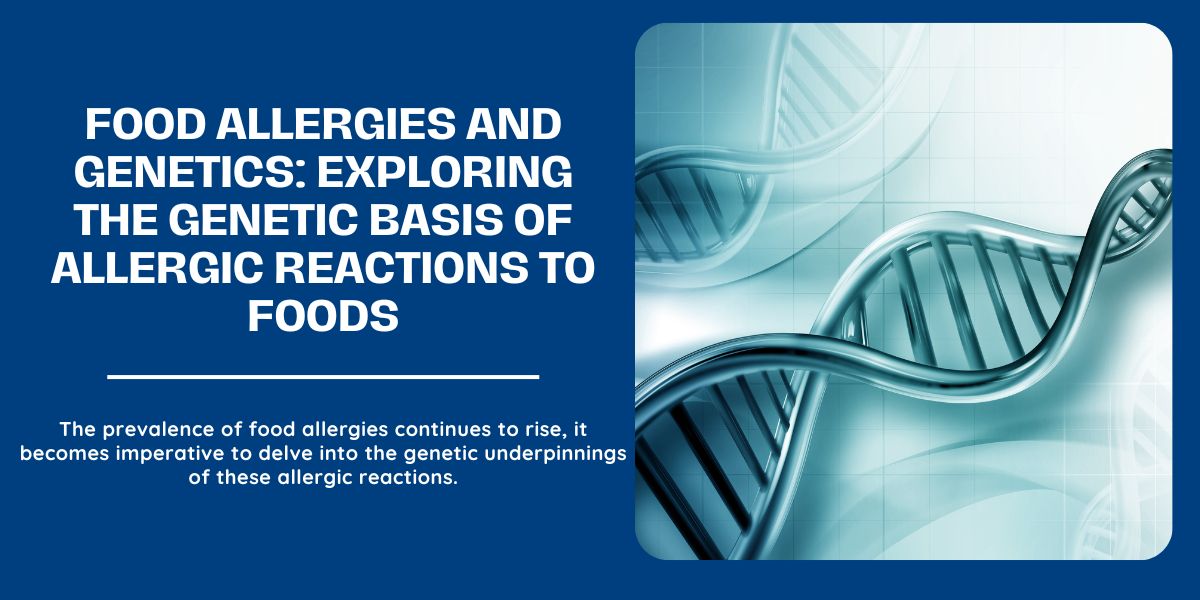Food Allergies and Genetics: Exploring the Genetic Basis of Allergic Reactions to Foods
From Genes to Reactions: A Comprehensive Exploration of How Genetics Influences Food Allergies

Food Allergies and Genetics
Food allergies, a growing concern worldwide, have a complex and multifaceted relationship with genetics. In this in-depth exploration, we’ll unravel the intricate genetic basis of allergic reactions to foods. From understanding the role of specific genes to exploring how genetic variations contribute to allergic sensitivities, this comprehensive guide aims to shed light on the intersection of genetics and food allergies.
Introduction: The Intersection of Genes and Food Allergies
As the prevalence of food allergies continues to rise, it becomes imperative to delve into the genetic underpinnings of these allergic reactions. The introduction sets the stage by highlighting the significance of understanding how our genes contribute to the development of food allergies.
Food Allergies Defined: An Immune Response Gone Awry
Food allergies are abnormal immune responses to specific proteins in certain foods. We’ll start by defining food allergies and providing an overview of how the immune system reacts to trigger allergic responses.
The Genetic Landscape of Food Allergies: Key Players and Mechanisms
Genes and Immune Responses: Understanding the Connection
Certain genes play a pivotal role in regulating the immune responses that lead to food allergies. We’ll explore how genes influence the development of the immune system and the mechanisms through which genetic factors contribute to allergic reactions.
Common Food Allergens and Their Genetic Links
Peanuts, Tree Nuts, Shellfish, and More: Unpacking Genetic Associations
Different foods trigger allergic reactions in susceptible individuals, and the genetic links vary across allergens. We’ll delve into the genetic associations with common food allergens, including peanuts, tree nuts, shellfish, and other prevalent triggers.
Specific Genes and Allergic Sensitivities: A Closer Look
HLA-DQ and Allergic Responses: The Influence of Genetic Variations
The HLA-DQ gene complex plays a crucial role in regulating immune responses to specific allergens. We’ll take a closer look at how variations in the HLA-DQ genes can influence the development of allergic sensitivities and impact the severity of allergic reactions.
Genetic Variations in Tolerance and Sensitization
Tolerance vs. Sensitization: How Genetic Variations Tip the Balance
The delicate balance between immune tolerance and sensitization is influenced by genetic variations. We’ll explore how specific genetic factors can either promote tolerance to certain foods or increase the likelihood of developing allergic sensitivities.
Childhood Allergies and Early Genetic Influences
Genetic Factors in Early Childhood Allergies: A Critical Developmental Period
Childhood is a critical period for the development of allergies, and genetics play a substantial role during this phase. We’ll investigate how early genetic influences contribute to the development of childhood food allergies and explore potential interventions for prevention.
Genetics and Cross-Reactivity: Understanding Allergen Similarities
Cross-Reactivity and Molecular Mimicry: Genetic Basis of Allergen Similarities
Cross-reactivity occurs when the immune system reacts to similar proteins in different foods. We’ll discuss the genetic basis of cross-reactivity, exploring how molecular mimicry and shared allergen structures contribute to allergic responses.
Genetics and the Severity of Allergic Reactions: Unraveling the Factors
From Mild to Anaphylaxis: Genetic Determinants of Reaction Severity
The severity of allergic reactions varies widely among individuals. We’ll unravel the genetic determinants that influence the spectrum of allergic reactions, from mild symptoms to life-threatening anaphylaxis.
Epigenetics and Environmental Influences: Modifying Allergic Responses
Epigenetic Modifications and Environmental Triggers: Shaping Genetic Expression
Epigenetic changes, influenced by environmental factors, can modify genetic expression and contribute to allergic responses. We’ll explore how environmental triggers interact with genetics, shedding light on the dynamic interplay between genes and the environment.
Personalized Medicine Approaches: Tailoring Allergy Management
Precision Allergy Management: The Promise of Personalized Medicine
Advancements in genetic research open the door to personalized approaches in managing food allergies. We’ll discuss how genetic information can inform personalized allergy management strategies, from targeted treatments to preventive measures.
Challenges in Genetic Allergy Research: Navigating Complexity
Complexities and Limitations: Challenges in Unraveling Genetic Contributions
Despite significant progress, challenges and limitations persist in understanding the full scope of genetic contributions to food allergies. We’ll explore these complexities, acknowledging the gaps in current knowledge and avenues for future research.
Conclusion: A Holistic Perspective on Food Allergies and Genetics
In conclusion, the relationship between genetics and food allergies is intricate and multifaceted. By unraveling the genetic basis of allergic reactions to foods, we gain insights that can inform prevention, management, and potential interventions. A holistic perspective that considers both genetic and environmental factors is essential in navigating the complexities of food allergies.




